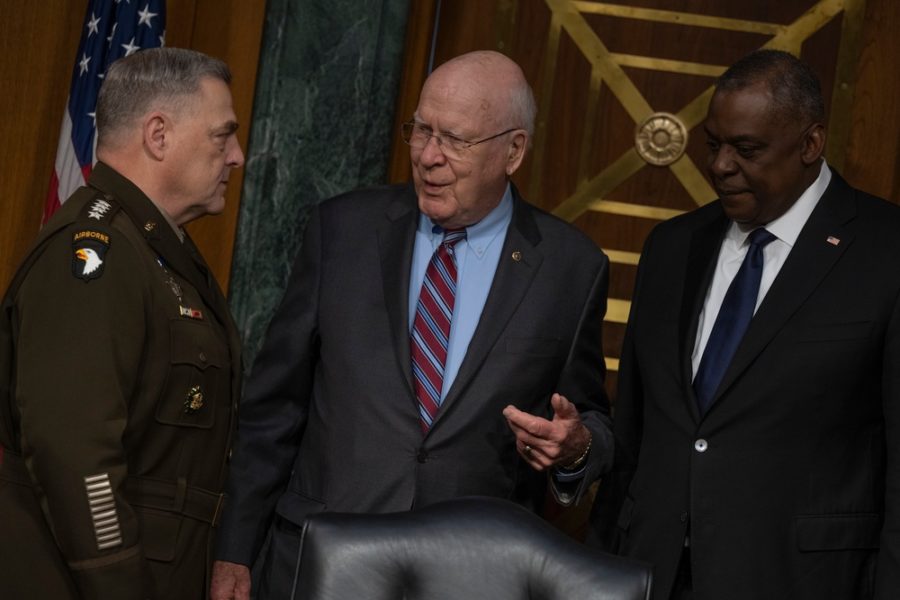A complete change in leadership is coming for one of the most important committees in the Senate, a change that could have trickle-down effects on the defense subcommittee that wields major influence over the Pentagon’s budget.
Sen. Patrick Leahy (D-Vt.) announced Nov. 15 that he would not seek reelection in 2022. Leahy currently serves as chair of the Senate Appropriations Committee, which oversees all discretionary spending legislation.
Senate committee leadership posts are most commonly decided by seniority—Sen. Dianne Feinstein (D-Calif.) is currently the second-most senior Democrat on the Appropriations panel but is widely expected to pass up the job as she did for the Senate Judiciary Committee during the current Congress.
Without Feinstein, Sen. Patty Murray (D-Wash.) is in line based off seniority to step up as either committee chair or vice chair, depending on which party controls the Senate after the 2022 midterms. She currently serves as chair of the Health, Education, Labor, and Pensions Committee.
Meanwhile, the Appropriations vice chairman, Sen. Richard Shelby (R-Ala.), announced in February that he would retire rather than run for reelection in 2022. He’s followed in seniority by Sen. Mitch McConnell of Kentucky, but given McConnell’s status as leader of the party in the full Senate, he is exceedingly unlikely to take on additional duties as the chair of any committee.
That would leave Sen. Susan Collins (R-Maine) in line to take over as either chair or vice chair alongside Murray. A similar process could unfold on the Senate Appropriations defense subcommittee, where Shelby is also the ranking member, followed by McConnell and then Collins in seniority.
Sen. Jon Tester (D-Mont.) is the current chair of the defense subcommittee, one of 12 sub-panels under Appropriations, but Leahy was also a member of the panel, meaning his departure will leave an open seat, a relatively rare occurrence as of late—Democrats have added just two new members to the committee since 2015.
While the Senate Armed Services Committee exercises the most oversight over the Pentagon and generates the annual National Defense Authorization Act that sets policy and authorizes funding, it is the Appropriations Committee that oversees the actual appropriation of monies, and the Defense subcommittee in particular is responsible for drafting the initial version of the appropriations bill that funds the DOD.
Roughly half of all discretionary government spending goes to defense, making a spot on the Appropriations defense subcommittee “equivalent to being on the other 11 subcommittees,” Mark Harkins, senior fellow at the Government Affairs Institute at Georgetown University, told Air Force Magazine. That makes any opening or change on the defense subcommittee a coveted spot.
“When you think about an appropriations bill, the first place it has to pass is a subcommittee, the second place it has to pass is the full committee, and then it has to pass the House and the Senate floor,” Harkins said. “So at each one of those levels, you get a bite at the apple, so to speak. And so if you’re at the beginning of the process, you have more opportunities for more bites, which allows you … to try to ensure that policy and money is more directed towards your state or district.”
When Tester was named chair of the subcommittee earlier this year, observers noted the implications for nuclear modernization, as his home state of Montana hosts Malmstrom Air Force Base, one of three bases armed with intercontinental ballistic missiles.
Similarly, Murray and Collins’ potential leadership roles could have implications for their states. A recent Pentagon study found that Washington state ranked in the top 15 nationally in both defense spending and personnel stationed there, with Boeing accounting for $3.8 billion in defense contractor spending. The Air Force in particular spent more than $1.3 billion in Washington, 14th most among all states and the District of Columbia.
Maine, meanwhile, is farther down the list in terms of total money and personnel but ranks 11th in percentage of state GDP that comes from defense spending—roughly $1.8 billion of that goes to General Dynamics, which owns the Bath Iron Works shipyard. The Air Force spent just $55 million in Maine in 2020, 47th among states.
All of these moves are still more than a year away, however, as Leahy is set to stay in the Senate until his term ends in January 2023. In the meantime, he will likely play a leading role as Congress looks to pass the appropriation bills necessary to fund the government—the continuing resolution currently funding it at fiscal 2021 levels expires after Dec. 3.
“The most powerful nation on Earth is running on autopilot,” Leahy said in a speech on the floor of the Senate on Nov. 4. “And we only have four weeks until the government shutdown, unless Congress takes action. It’s not a theoretical exercise. The actions we take or don’t take in this chamber, with respect to the fiscal year 2022 appropriations bills, affect people’s lives, but also the direction of this nation.”


